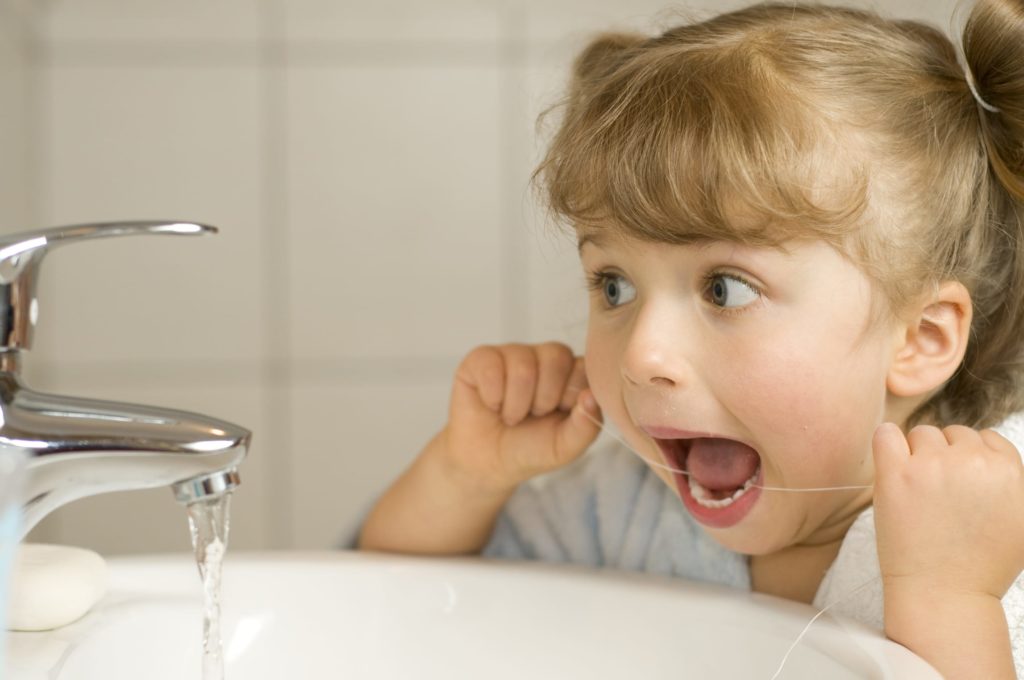Good dental health starts when you’re young. If you want your kids to have healthy teeth and gums, you need to promote good habits early on. Many of the same rules apply when it comes to taking care of little teeth, but use the following information as a guide to keeping their pearly whites in great condition.
Daily Brushing
Brushing teeth is probably the most important thing your child can do to prevent cavities. She should brush her teeth at least two times a day or after every meal. Young children don’t always do an effective job of brushing their teeth on their own. Watch how she does it. She should be brushing the front, back and tops, using circular motions. Ideally, tooth brushing should last around two minutes. If she’s just swirling the toothbrush around in her mouth for a few seconds, you need to step in and assist. Electric toothbrushes are often a good solution for children because the brushing is powerful and there is often a built-in timer. However, some electric toothbrushes have brush heads that are too big for small mouths. Ask your child’s dentist for a recommendation or check out our electric toothbrush reviews.
Flossing
Flossing removes the small pieces of food that gets stuck in between the teeth where toothbrushes can’t reach. It’s every bit as important to floss every day as it is to brush. This can be hard for children who may not have the fine motor skills necessary to do it properly. One easy solution is to purchase disposable plastic flossers. Children simply have to position it and bite down to get the floss between the teeth. Water flossers are also an excellent solution for the entire family. The strong stream of water blasts those food particles out. Our reviews of water flossers can help you make your selection.
Mouthwash
Mouthwash can play a role in helping keep the mouth clean because it fights the germs that can cause plaque and infections. Some mouthwashes even contain fluoride to help keep the teeth strong. The main problem is that the taste is often so bad that kids don’t want to use mouthwash. Look for children’s versions of mouthwash or check out our mouthwash reviews. Additionally, swallowing mouthwash can make your child sick. Only children who are old enough to understand that they need to spit the mouthwash out should use it.
Visits to the Dentist
Good dental health relies on periodic checks from a dentist since a dentist can identify minor problems before they turn into major ones. Take your child to the dentist twice a year for regular check-ups and cleaning sessions. In the early years, the point of these trips is more to get your child used to seeing the dentist rather than actually getting the teeth cleaned. For example, if your young child is scared, the dentist might only take a quick look in his mouth at his first appointment. As he gets older, expect more extensive treatments, such as x-rays and tooth polishing. Most dentists also offer children instructions in proper tooth care as well, showing them the correct way to brush and floss teeth.
Crooked Teeth
Braces and other types of orthodontia can straighten out crooked teeth. If your child’s teeth are coming in at odd angles, you might be tempted to get it fixed right away. However, it’s usually best to wait until the child is close to 13 years old. Sometimes, teeth straighten out on their own as the child’s head grows enough to make space for the teeth. In any case, you want the child to have all of her permanent teeth before treating the crookedness. A visit to an orthodontist will help you learn about all of the options that are available to her. Treatment might involve pulling some teeth to make space. Minor crookedness can sometimes be resolved with invisible braces.
Teeth Whitening
It often seems that yellowing teeth is a problem that only adults deal with, but it’s not uncommon for children to have teeth that are starting to dull. Should you try to whiten his teeth? The answer is debatable. Most of the whitening products available over-the-counter or in the dentist’s office contain harsh chemicals, and tooth sensitivity is a common side effect of teeth whitening. Perhaps the biggest risk with using over-the-counter whitening products for children is that there’s a much greater chance of user error when they apply the treatment themselves. Children may leave the treatment on for more than the recommended time, or they may apply the treatment in a way that it’s touching the gums along with the teeth. Talk to your child’s dentist about teeth whitening. If given the “OK” to do something, check out our reviews of teeth whiteners to find the best one for your child and monitor his use carefully. Otherwise, you might consider some more natural ways to whiten his teeth, such as brushing them with baking soda.
A parent’s job is to build healthy habits no matter what. By placing a strong emphasis on good oral health in the early years, children will learn how to take care of their teeth for years to come. This will prevent a lot of problems in the long run.
